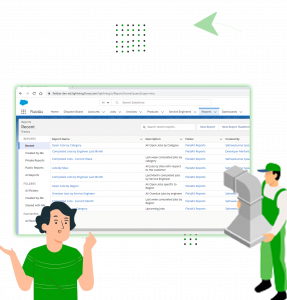Field service management involves coordinating and managing tasks such as dispatching technicians, scheduling appointments, and ensuring timely and efficient service delivery. To excel in this dynamic and demanding industry, businesses need sophisticated tools that go beyond basic operations. This is where analytics and reporting features in field service software play a crucial role.
By harnessing the power of data analytics and reporting, field service companies can gain valuable insights, improve decision-making, enhance operational efficiency, and ultimately boost customer satisfaction. In this article, we will delve deeper into why analytics and reporting features are indispensable in field service software.

Reporting in Field Service Software
One of the key reasons why analytics and reporting features are crucial in field service software is the ability to track and measure the performance of your field service operations. Reporting allows you to gather data on various aspects of your business, such as service requests, technician productivity, customer satisfaction, and more.
By having access to comprehensive reporting tools, you can identify trends, pinpoint areas for improvement, and make informed decisions to optimize your field service operations. This data-driven approach can help you increase efficiency, reduce costs, and ultimately enhance the overall customer experience.
- Real-time Visibility: Reporting features provide real-time visibility into the status of service requests, technician schedules, and job completion rates. This allows you to monitor your operations closely and make adjustments as needed to meet service level agreements.
- Performance Metrics: With reporting capabilities, you can monitor key performance metrics such as first-time fix rate, average response time, and customer satisfaction scores. By tracking these metrics over time, you can better understand the strengths and weaknesses of your field service team.
- Compliance and Accountability: Reporting features can also help ensure compliance with industry regulations and standards. By generating detailed reports on service activities, you can demonstrate accountability and transparency to your customers and stakeholders.
Benefits of Real-Time Data Analysis
Real-time data analysis allows businesses to make quick decisions based on up-to-date information. By having access to real-time data, businesses can respond swiftly to changing circumstances and make informed decisions on the spot.
Monitoring service operations and workflow in real-time is crucial for businesses to ensure smooth operations and efficient service delivery. Real-time data analysis provides visibility into the current status of service operations, allowing businesses to detect any bottlenecks or issues and address them promptly to maintain service excellence.
Identifying and addressing issues promptly is key to preventing escalation and minimizing impact on service delivery. With real-time data analysis, businesses can proactively detect and resolve issues before they escalate, ensuring continuous service delivery and customer satisfaction.
Improving Work Efficiency and Productivity
Field service software with analytics and reporting features plays a crucial role in enhancing work efficiency and productivity for businesses. By utilizing these tools, companies can track key performance indicators and metrics effectively, allowing them to optimize schedules and resources for maximum efficiency.
- Tracking Key Performance Indicators: Analytics and reporting features provide businesses with real-time data on their performance metrics. This enables them to identify areas for improvement and make necessary adjustments to enhance efficiency.
- Optimizing Schedules and Resources: With the help of analytics, businesses can analyze data to better allocate resources and schedule tasks efficiently. This not only saves time but also helps in maximizing productivity.
- Automation of Processes: Field service software automates various processes, such as task assignment and scheduling, which leads to increased productivity. By eliminating manual tasks, employees can focus on more strategic and value-added activities.
Enhancing Customer Satisfaction and Service Quality
Customer satisfaction is a key metric for any field service business. By utilizing analytics and reporting features in field service software, businesses can enhance customer satisfaction and improve service quality in various ways.

Real-Time Data Analysis Enables Faster and More Efficient Service
- Faster Response Time: With real-time data analysis, businesses can respond to customer requests quickly, leading to higher satisfaction levels.
- Efficient Resource Allocation: By analyzing real-time data, businesses can allocate resources effectively, ensuring timely service delivery.
Identifying Trends and Patterns for Service Improvement
- Trend Analysis: Analytics and reporting features help in identifying trends and patterns in service delivery, allowing businesses to make necessary improvements.
- Quality Optimization: By analyzing data insights, businesses can optimize service quality, leading to higher customer satisfaction levels.
Providing Insights for Performance Evaluation and Optimization
- Performance Evaluation: Analytics and reporting features provide insights for evaluating service performance and identifying areas for improvement.
- Optimization Strategies: By analyzing data, businesses can develop strategies to optimize service delivery, ensuring higher customer satisfaction levels.
Identifying Trends and Patterns for Strategic Decision-Making
Field service software with analytics features plays a crucial role in helping businesses identify trends and patterns for strategic decision-making. By analyzing data in real-time, businesses can gain valuable insights that enable them to make informed decisions that drive success.
- Enabling Data-Driven Decisions: With analytics features, businesses can leverage data to make informed decisions regarding service management. This data-driven approach ensures that the decisions made are based on factual information rather than gut feeling.
- Predictive Maintenance and Proactive Service Management: By utilizing analytics capabilities, businesses can predict maintenance needs and proactively address them before they become larger issues. This not only improves operational efficiency but also enhances customer satisfaction by minimizing downtime.
Ensuring Compliance with Service Level Agreements
Analytics and reporting features play a crucial role in ensuring compliance with service level agreements. By utilizing these tools, businesses can track their performance and monitor key metrics to meet customer expectations.
- Tracking SLA Compliance: Analytics tools provide businesses with real-time data analysis to track their performance against agreed service level agreements. This helps in identifying any deviations and taking corrective actions promptly.
- Improved Service Delivery: By monitoring performance metrics, businesses can identify areas for improvement in their service delivery process. This allows them to make necessary adjustments to meet customer expectations effectively.
- Maintaining Service Quality: Monitoring service level agreements ensures that businesses maintain high service quality standards. This leads to increased customer satisfaction and loyalty in the long run.
Providing Insights for Performance Evaluation and Optimization
Analytics and reporting features in field service software play a crucial role in providing valuable insights for performance evaluation and optimization. By analyzing data in real-time, businesses can identify areas for improvement and make the necessary adjustments to enhance their overall service management and customer satisfaction.
- Identifying Improvement Areas: With the help of analytics tools, businesses can pinpoint specific areas where performance can be enhanced, whether it be in response times, resource allocation, or overall service quality.
- Making Necessary Adjustments: By utilizing the insights gained from analytics and reporting, companies can implement changes to their operations and workflows to optimize performance and achieve better results.
- Enhanced Service Management: The ability to track and analyze key performance metrics allows businesses to effectively evaluate their performance and make informed decisions to improve their service management processes.
- Customer Satisfaction: By optimizing performance through data-driven insights, companies can ensure that they are meeting and exceeding customer expectations, leading to higher levels of satisfaction and loyalty.
See how FieldAx can transform your Field Operations.
Try it today! Book Demo
You are one click away from your customized FieldAx Demo!
FAQ
1. Why are analytics and reporting features important in field service software?
Answer: Analytics and reporting features in field service software are important because they provide valuable insights into key performance metrics, service trends, and customer satisfaction levels. This data helps organizations make informed decisions, improve operational efficiency, and deliver better service to customers.
2. How can analytics help improve work efficiency and productivity?
Answer: By analyzing real-time data and identifying inefficiencies in workflows, field service software with analytics capabilities can help organizations streamline operations, optimize resource allocation, and reduce downtime. This leads to improved work efficiency and higher productivity levels.
3. What role do analytics play in enhancing customer satisfaction and service quality?
Answer: Analytics enable organizations to track customer feedback, service requests, and response times, allowing them to identify areas for improvement and address customer concerns promptly. This leads to higher customer satisfaction levels and improved service quality.
4. How can analytics help in identifying trends and patterns for strategic decision-making?
Answer: Analytics tools in field service software can analyze large volumes of data to identify trends, patterns, and anomalies that may not be apparent through manual analysis. This helps organizations make data-driven decisions, forecast future trends, and stay ahead of the competition.
5. How do analytics features ensure compliance with service level agreements?
Answer: By tracking key performance indicators and service metrics in real-time, analytics features in field service software help organizations monitor their adherence to service level agreements, identify potential breaches, and take corrective actions to meet SLA requirements.
6. How can analytics help in streamlining service operations and workflow?
Answer: Analytics features can provide insights into service delivery workflows, resource utilization, and process bottlenecks, allowing organizations to optimize their operations, automate routine tasks, and improve overall service efficiency.
7. How do analytics features provide insights for performance evaluation and optimization?
Answer: By analyzing historical data, benchmarking performance metrics, and generating actionable insights, analytics features help organizations evaluate their performance, identify areas for improvement, and implement optimization strategies to enhance service delivery.
Conclusion
Analytics and reporting features play a crucial role in field service software, providing valuable insights and data that are essential for businesses to thrive in today’s competitive market. By leveraging real-time data analysis, companies can improve work efficiency, enhance customer satisfaction, identify trends for strategic decision-making, ensure compliance with SLAs, streamline operations, and optimize performance.
Ultimately, the use of analytics and reporting features can help businesses make informed decisions, improve service management processes, and enhance overall customer satisfaction. By investing in field service software with robust analytics capabilities, companies can stay ahead of the competition and drive success in their respective industries.
Author Bio
Co-Founder & CMO at Merfantz Technologies Pvt Ltd | Marketing Manager for FieldAx Field Service Software | Salesforce All-Star Ranger and Community Contributor | Salesforce Content Creation for Knowledge Sharing






